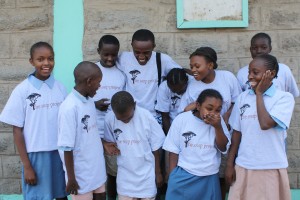“I believe in the power of photography to empower children,” says Maddie Brandenburger (’11), founder and director of The Snap Project. She currently lives in India where she holds an IDEX Fellowship in Social Enterprise.
What is The Snap Project and how did you get involved?
The Snap Project is a social enterprise which I founded after I received the Chambers entrepreneurial seed venture grant in the Spring of 2011. The Snap Project works to empower children in East Africa through photography training and providing access to cameras. After I created the website I began selling my photograph prints in April 2011. I held an opening exhibition in the Scales Fine Arts Center during graduation weekend. It was a huge success and great launching point for the organization.
I sell both canvas and poster prints in assorted sizes and use the proceeds from my photography sales to provide cameras, training, classroom space and field trip funding for The Snap Project children. One month after the website launched, the children received cameras and the class was under way! My friend and photographer Charles Kigotho works with the children in the Mathare slums every Saturday for three hours at a time. The first class will meet for a total of six months before the second class begins.
In addition, 15 percent of The Snap Project’s revenue is given to the Nyanya Project bi-annually. The Nyanya Project is a certified nonprofit organization started by Lecturer in Journalism Mary Martin Niepold that works with grandmothers who care for their grandchildren orphaned by HIV/AIDS. I worked closely with Professor Niepold for a semester before going with her to East Africa to conduct field research for the Nyanya Project.
Why is this project important to you, and how do you think it changes the lives of the children involved?
I believe in the potential for photography to empower children. I have witnessed the effects of photography on children across cultures and continents. I combined this belief with my passion for photography and The Snap Project was born. By empowering young people to develop skills as photographers, we will raise awareness of the reality of socioeconomic issues through the eyes of the youth who confront those realities every day. We use a unique approach that combines art and advocacy.
The Snap Project encourages children to express themselves through photography.
I recently spent a week in Nairobi, Kenya, meeting The Snap Project’s first class. I am very impressed by the children’s ambition and contagious enthusiasm for the project. The 15 children range in age from 10 to 15 years old, and each has a different story to tell.
I took turns speaking with different kids about the ways the project has impacted them, finding out how it has made a difference in their life. Nancy, 12, expressed how she was able to, “document social issues and express herself through photography.” Agnes, 10, expressed that she “has been inspired to inspire other people through her photography.” Vincent, 15, stated his “excitement to be a part of something that big people will notice.”
The greatest joy of the trip to Nairobi was witnessing the true impact The Snap Project has made on these children’s everyday lives. The children are learning to use photography to express themselves and for the first time, they feel a sense of empowerment. In addition, the children receive mentoring from Charlie and have established a sense of community and connection among themselves.
Can you tell us about the fellowship you now hold in India?
I am living in Hyderabad, India, for a year on an IDEX Social Enterprise fellowship. I am working at a school in the Affordable Private School sector on the business-end of the system to implement programs that can change and develop schools that primarily serve underprivileged youth in India.
Were there particular people or programs at Wake Forest that inspired you to pursue a path of humanitarian service?
I was constantly inspired by my professors, my friends and my courses at Wake Forest. I was fortunate enough to research extensively in East Africa on research grant opportunities from organizations, such as Dvelo Fund and MFI Connect and in particular, the WFU Center for Entrepreneurship. My courses in the humanities encouraged me to explore my curiosity about the developing world. All of the three forces combined have inspired me to pursue a career in humanitarian service and have led me to India where I am today.
Is there something you miss most about Wake Forest?
I miss the community at Wake Forest. I miss being able to call any of my friends knowing they are less than a mile away, meeting professors in Shorty’s, and just hanging out on campus.


